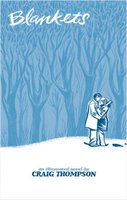 I just finished reading Craig Thompson's Blankets. Clocking in at just shy of 600 pages, it looks a little daunting at first, but it was in fact a pretty smooth read. I probably could have finished it much sooner than I did, but I tried to make a point of spending some time studying some of his page layouts and individual illustrations.
I just finished reading Craig Thompson's Blankets. Clocking in at just shy of 600 pages, it looks a little daunting at first, but it was in fact a pretty smooth read. I probably could have finished it much sooner than I did, but I tried to make a point of spending some time studying some of his page layouts and individual illustrations.The story is autobiographical. It relays the story of Thompson's first love and his coming to grips with his own religious beliefs. But that hardly says much about the book, does it?
Let me say first that the artwork is wonderful. There's a deep richness in Thompson's illustrative style, and his brush work gives everything a very lush depth. He also uses it to great advantage when trying to communicate the mood of any given scene. The illustrations themselves, too, take some cues from Japanese comics. Not that the book appears manga-ish in any way, but Thompson's backgrounds are detailed and realistic, while the characters themselves are simplified and iconics -- allowing for the reader to more easily become in touch with them. (Something I -- and I suspect Thompson -- picked up from Scott McCloud's Understanding Comics.) Further, there's some excellent visual symbolism throughout the book, and Thompson clearly has a solid mastery of comic book storytelling.
Although it's not split in two quite so decisively, half of the book concerns Thompson's first love and half concerns the evolution of his religious beliefs. Speaking as someone who pretty conclusively decided to become an aetheist in his early teens, I found it difficult to relate to the religious parts of the book. Not counting weddings, I can count on one hand the number of times I've been in a church of any denomination. I'm just not a religious guy, so I had a lot of difficult in relating to those portions of the book.
That said, though, I identified quite heavily with the love story and felt that worked extremely well. While I can't say that I've had quite the same physical or spiritual experiences in my love life, I can easily see myself in the emotional experiences. Thompson seems to do a very effective job of drawing the reader into the story, and it's largely my profound lack of faith in a supreme being that prevented me from becoming even more engrossed in the story.
With all that said, I really enjoyed most of the book.
Most.
I was really disappointed with the ending. Oh, I could handle the fact that it doesn't exactly have a "happily ever after" ending -- some of my favorite stories in fact are center on dystopian futures where the protagonist dies -- but I felt that the ending suggested that, because Thompson drew this story out, the actual events of the story were irrelevant to his life. I suspect I'm reading something into his book that wasn't intended. I suspect that he's shooting more for a kind of "it's better to have loved and lost..." but I don't know that that comes across as strongly as it should. For as strong as the rest of the story is, and how clear as the rest of it is, the ending just seemed to fall a little flat.
But, hey, that's just my take on it. Overall, it was still worth reading and I'm glad I had the chance to read it for myself.









0 comments:
Post a Comment